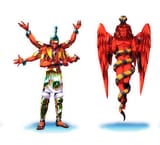Search Results
7/8/2025, 9:36:48 PM
>>509856653
>Finally, on the Vedic side, it is possible that Varuṇa’s identity with the enemies’ god Ahura Mazdā had something to do with his decline and gradual disappearance from the Vedic horizon: “One notices the decline of Varuṇa in Book X, which has no hymn for him (…) If he is seen in his glory in some of the Family Books, Book X registers his decline and subordination to Indra.” (Pradhan 2014:153-154) At any rate, he did decline, both in power and in moral stature: “Varuṇa, who is now second to Indra unlike in VI, VII and IV, is reduced to singing his praises (…) Varuṇa of Books X and I acquires semi-demoniacal features which he did not have in the Family Books (…) the former guardian of immortality is now associated with the world of the dead (…) unlike in the early Ṛgveda, the [later] Saṁhitās treated Varuṇa with dread” (Pradhan 2014:156)
>This is only a partial and gradual demonization of Varuṇa the Asura, nothing like the radical demonization of Indra the Daēva. But this is commensurate with the fleeting Paurava war psychology as against the deep grudge the Ānavas bore after their defeat
>Finally, on the Vedic side, it is possible that Varuṇa’s identity with the enemies’ god Ahura Mazdā had something to do with his decline and gradual disappearance from the Vedic horizon: “One notices the decline of Varuṇa in Book X, which has no hymn for him (…) If he is seen in his glory in some of the Family Books, Book X registers his decline and subordination to Indra.” (Pradhan 2014:153-154) At any rate, he did decline, both in power and in moral stature: “Varuṇa, who is now second to Indra unlike in VI, VII and IV, is reduced to singing his praises (…) Varuṇa of Books X and I acquires semi-demoniacal features which he did not have in the Family Books (…) the former guardian of immortality is now associated with the world of the dead (…) unlike in the early Ṛgveda, the [later] Saṁhitās treated Varuṇa with dread” (Pradhan 2014:156)
>This is only a partial and gradual demonization of Varuṇa the Asura, nothing like the radical demonization of Indra the Daēva. But this is commensurate with the fleeting Paurava war psychology as against the deep grudge the Ānavas bore after their defeat
Page 1
